Search the Special Collections and Archives Portal
Search Results
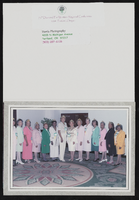
Alpha Kappa Alpha Sorority 75th Far Western Region conference materials
Date
Archival Collection
Description
From the Alpha Kappa Alpha Sorority, Incorporated, Theta Theta Omega Chapter Records (MS-01014) -- Chapter records file.
Text
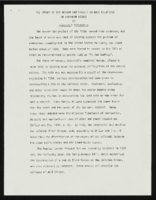
"The Impact of the Hoover Dam Project on Race Relations in Southern Nevada": manuscript draft by Roosevelt Fitzgerald
Date
Archival Collection
Description
From the Roosevelt Fitzgerald Professional Papers (MS-01082) -- Unpublished manuscripts file.
Text
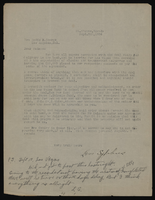
Correspondence, Levi Syphus to Sadie George
Date
Archival Collection
Description
Text

Meeting minutes for Consolidated Student Senate University of Nevada, Las Vegas, Febuary 5, 1987
Date
Archival Collection
Description
Text
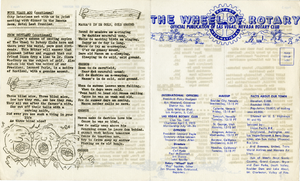
The Wheel of Rotary Las Vegas Rotary Club newsletter, October 6, 1949
Date
Archival Collection
Description
Text

The Wheel of Rotary Las Vegas Rotary Club newsletter, March 16, 1950
Date
Archival Collection
Description
Text
Laura Perkins (University of Nevada Regent) oral history interview conducted by Kelliann Beavers: transcript
Date
Archival Collection
Description
From the Lincy Institute "Perspectives from the COVID-19 Pandemic" Oral History Project (MS-01178) -- Elected official interviews file.
Text
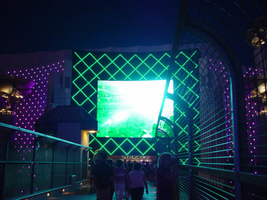
Photographs of MGM Grand signs, Las Vegas (Nev.), 2002
Date
Archival Collection
Description
Site name: MGM Grand Hotel and Casino
Site address: 3799 S Las Vegas Blvd
Sign owner: MGM Mirage
Sign details: The MGM Grand is host to several types and numbers of signs around the exterior of the property. These types include the MGM lion logo and text which adorn the tops of the towers, a multimedia pylon sign, a golden monument sculpture of a lion which serves as the main entrance, and several smaller textual signs that denote parking and entrances.
Sign condition: Structure 5 Surface 5 Lighting 5 Notes: The MGM's signage is excellent repair, being a less than a decade old. The structure is intact, as well as all the lighting, and surface.
Sign form: Pylon; Fascia; Porte-cochère
Sign-specific description: The property contains different types signs including Pylon, sculpted three-dimensional signs as well as building front logos. The pylon sits along the East side of Las Vegas Blvd, just north of Tropicana Blvd, and faces north /south. Constructed as if to appear as different sized towers from the emerald city, the double backed pylon contains the MGM Lion Logo in a backlit steel cabinet and the Letters "MGM" at the top in gold polished channel letters with horizontal bars of Neon. Directly beneath that sit two message centers one being an animated color LED screen on the left, and the one on the right being a backlit plastic advertisement screen. Located beneath the two screens the phrase The City of Entertainment in all capital polished gold aluminum channel letters with neon running horizontally across the diameter of the letters. The sculpted three dimensional lion structure sits on the North East corner of Las Vegas Blvd and Tropicana and faces to the Southwest. The statue appears to be made of polished gold and is surrounded by an impressive array of fountains, which are illuminated themselves. The statue is ambiently lit from underneath with spot lighting and the glow of the fountains. Serving as a backdrop for the structure, an impressive wall of multicolored incandescent bulbs form a concave geometric canvass that wraps the corner of the building. This wall is separated into different sized fields by square columns of similar height. Sitting atop each of the columns is a statue of a man holding a giant urn upon his back. The statuary is lit from underneath with ambient lighting similar to that of the lion sculpture. The bulbs animate in a subtle waving pattern that gently creates the illusion of a rippling of the surface.
Sign - type of display: Neon; Incandescent; Matrix; Backlit
Sign - media: Steel; Plastic; Fiberglass; Masonry; Glass
Sign animation: Chasing, flashing, oscillating
Notes: The V-shaped red channels on the silver main pylon chase each other downward toward the ground. The main text on the pylon animates as well. The letters light up one at a time with red neon from left to right as the arrows continue to chase downward. The logo/text sign located above the giant replica of the Harley Davidson, animate as well. The incandescent bulbs which fill the text, spelling the name of the establishment, oscillate, steady burn, then shut off, and then restarting the sequence. The letters that spell cafe on the lower portion of the sign animate in concert and with the same sequence as the main text.
Sign environment: The MGM Grand dominates the corner on which it sits. Headed west on Tropicana toward the Strip the property casts a green glow but not too electrifying. Once you reach the corner you can't help but be overwhelmed by standing underneath the looming golden lion and the bustling fountains. Facing the structure from the corner, the facade becomes a canvass of dancing light and water. Look up toward the strip the giant pylon booms the golden letters "MGM" and busy LED screens.
Sign - date of installation: Property was opened in 1993 but signage was changed in 1998
Sign - date of redesign/move: The original sculpted lion entrance was replaced in 1998 with a new trophy style sculpture. With the original sphinx structure, patrons passed trough the mouth of the lion into the main lobby of the hotel. Guests and visitors now pass around the pedestal on which the lion sits upon.
Sign - thematic influences: The exterior of the MGM Grand Hotel incorporates the themes of the movie industry for which the name is so prominent. Most specifically the Wizard of Oz's Emerald city theme. The structure is designed to look as such with the base color of the building being emerald green as well as the pylon structures and attached buildings such as the parking garage. The font and MGM lion logo are represented with gold coloring referencing Oz's yellow brick road. The statue is reminiscent of an Academy award also referencing the industry which the name is so familiar with.
Sign - artistic significance: The establishment joins the era of themed modern Vegas resorts with its front spectacle, super pylon and aesthetic which is entirely encompassed by its theme.
Surveyor: Joshua Cannaday
Survey - date completed: 2002
Sign keywords: Oscillating; Pylon; Fascia; Porte-cochère; Neon; Incandescent; Matrix; Backlit; Steel; Plastic; Fiberglass; Masonry; Glass
Mixed Content

Transcript of interview with Phillip L. Cook by Richrad Strahan, March 3, 1977
Date
Archival Collection
Description
On March 3, 1977, Richard Strahan interviewed Phillip L. Cook (born 1939 in Las Vegas, Nevada) about his life in Southern Nevada. Cook first talks about his parents’ move to Nevada and then describes how the school system has changed over time. He then describes the first businesses that opened up in the Downtown and Strip areas in Las Vegas before discussing prostitution, Block 16, and recreational activities available to youth. Cook also talks about the first television sets and telephone systems made available, and he moves on to talk about the prices of things such as movies and haircuts when he was younger. The interview then moves to discussions on the Old Ranch, racial discrimination, school integration, the crime rate, and the school system in Las Vegas.
Text

